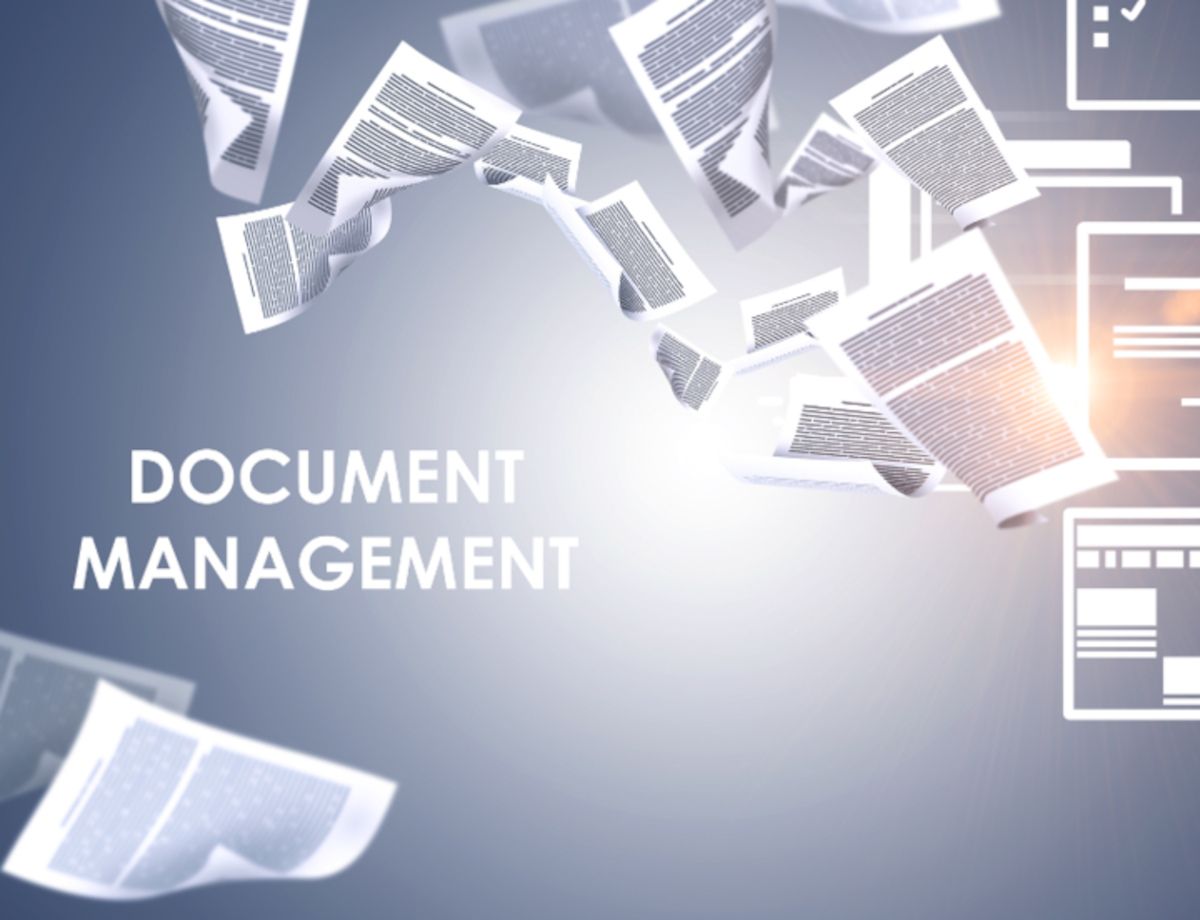What Is a Document Management System? And Why Is It Useful?
June 6th, 2023 by Function4

Discover the benefits of using a document management system for your business.
What is a Document Management System? And why is it Useful?
In today's business world, managing documents and information can be overwhelming. Documents exist in different formats and come from various sources, making it challenging to keep track of them. Fortunately, document management systems (DMS) can help businesses stay organized and efficient. In this article, we'll explore what a document management system is and why it's useful for businesses of all sizes.
The Benefits of Document Management Systems
Document management systems (DMS) are software platforms that help businesses manage, store, and retrieve digital documents. These systems provide a centralized location for all types of documents, such as contracts, invoices, and proposals. With a DMS, businesses can enjoy several benefits, such as:
- Improved document security
- Better and faster access to information
- Increased collaboration among employees
- Reduced storage costs and space
Document security is one of the most significant benefits of using a DMS. Traditional paper-based document storage systems are vulnerable to theft, damage, and loss. However, with a DMS, businesses can ensure that their documents are secure and protected from unauthorized access. DMS systems offer several security features, such as user authentication, access control, and encryption, which help safeguard sensitive information.
Better and faster access to information is another advantage of using a DMS. With a DMS, businesses can search for and retrieve documents quickly and easily, eliminating the need to spend hours searching through file cabinets or folders. This improved access to information can help businesses make better decisions, respond quickly to customer needs, and improve overall productivity.
Increased collaboration among employees is another significant benefit of using a DMS. With a DMS, employees can work together on documents in real-time, regardless of their location. This increased collaboration can lead to better communication, more efficient workflows, and improved team performance.
Reduced storage costs and space is another advantage of using a DMS. Traditional paper-based document storage systems can take up significant amounts of space and require costly storage solutions. However, with a DMS, businesses can store all their documents digitally, eliminating the need for physical storage space and reducing storage costs.
Moreover, businesses can eliminate paperwork and streamline workflow processes with DMS, enhancing productivity and quicker responses to customer needs. By digitizing documents and automating workflows, businesses can reduce manual processes, save time, and improve overall efficiency.
In conclusion, document management systems provide several benefits to businesses, including improved document security, better and faster access to information, increased collaboration among employees, and reduced storage costs and space. By implementing a DMS, businesses can streamline their document management processes, enhance productivity, and improve their overall operations.
Streamlining Your Business with Document Management Systems
A Document Management System (DMS) is a software solution that streamlines a company's operations by organizing documents, automating tasks, and centralizing control. Instead of filing documents in different physical locations, employees can upload, view, and share documents from a single platform. This not only saves time but also increases productivity and reduces the likelihood of errors.
Document management is a critical aspect of any business. It involves the creation, storage, and retrieval of documents. In the past, businesses relied on paper-based systems to manage their documents, which was both time-consuming and error-prone. With the advent of DMS, businesses can now manage their documents more efficiently.
With the use of DMS, businesses can adopt a more efficient document management workflow. Traditionally, documents are manually shuffled between employees and departments, leading to delays, missed deadlines and inaccuracies. A DMS automates tasks, such as document routing and approval processes, freeing up time and resources for more mission-critical tasks. Additionally, businesses can track the status of documents, quickly find missing items and save time.
DMS also allows businesses to improve their compliance with regulatory requirements. Many industries are subject to strict regulations regarding document management. DMS helps businesses to comply with these regulations by providing a secure, auditable, and transparent system for managing documents.
Another benefit of DMS is that it reduces the risk of data loss. With paper-based systems, documents can be lost or damaged due to fire, flood, or other disasters. DMS provides a secure backup system that ensures that documents are safe and can be easily recovered in case of a disaster.
Finally, DMS also helps businesses to save money. By reducing the need for paper-based systems, businesses can save on printing, storage, and transportation costs. Additionally, DMS can help businesses to reduce the time and resources required for document management, freeing up resources for other important tasks.
In conclusion, DMS is a valuable tool for any business looking to streamline their operations and improve their document management workflow. By centralizing control, automating tasks, and providing a secure, auditable, and transparent system for managing documents, DMS helps businesses to save time, increase productivity, reduce errors, improve compliance, reduce the risk of data loss, and save money.
Enhancing Security with Document Management Systems
DMS provide superior security against document loss, data theft, and unauthorized access with several layers of data security measures. A typical DMS stores documents in a secure central repository that is accessible only to authorized users. Password-protected accounts and role-based access controls further enhance system security. Version control, audit trails, and backup and recovery systems provide additional safeguards against document loss and accidental deletions.
Document management systems are an essential tool for businesses of all sizes. They not only help to streamline document management processes but also enhance security measures. With the increasing number of cyber threats, it has become more important than ever to protect sensitive company information from hackers and other malicious actors.
One of the key features of a document management system is its ability to store documents in a secure central repository. This means that all documents are stored in one central location, making it easier to manage and control access. Only authorized users can access this repository, and all access is logged and monitored for security purposes.
In addition to a secure central repository, document management systems also provide password-protected accounts and role-based access controls. This means that users can only access the documents that they need to do their job. For example, an employee in the finance department may only have access to financial documents, while an employee in the marketing department may only have access to marketing documents.
Version control is another important feature of document management systems. This allows users to track changes made to documents and revert to previous versions if necessary. This is particularly important in industries such as healthcare and finance, where accuracy and compliance are critical.
Audit trails are also a key feature of document management systems. This allows administrators to track who has accessed documents and when. This information can be used to identify potential security breaches and take appropriate action to prevent further unauthorized access.
Finally, backup and recovery systems are an essential part of any document management system. These systems ensure that documents are backed up regularly and can be recovered in the event of a disaster or system failure. This provides an additional layer of security against document loss and accidental deletions.
In conclusion, document management systems are an essential tool for businesses looking to enhance their document management processes and improve security measures. With features such as a secure central repository, password-protected accounts, version control, audit trails, and backup and recovery systems, businesses can be confident that their sensitive information is protected from cyber threats and unauthorized access.
The Advantages of Cloud-Based Document Management Systems
Cloud-based DMS are versatile and allow users to access critical documents from any location with an internet connection. Unlike on-premises DMS, cloud-based systems require no hardware or software installation. The provider handles storage, security, and maintenance, freeing up company IT staff for more essential tasks. Furthermore, cloud-based DMS can be easily scaled up or down to suit business needs. There are no upfront costs associated with cloud-based DMS because they charge only for usage based on storage and users
Improving Collaboration with Document Management Systems
Collaborating and sharing information remain critical elements for successful businesses. A DMS simplifies document sharing, either internally, with external partners or customers. This collaboration promotes more teamwork and increases responsiveness. Additionally, DMS allows real-time document editing among office colleagues and remotely regardless of their location. Collaboration results in more accurate, high-quality data that can be securely shared among departments, teams, and external partners.
Enhancing Productivity with Document Management Systems
A DMS automated workflows, reduces the need for physical handling of documents, and eradicates human error, making processes faster and more streamlined. Users can easily filter, sort, and search their documents to locate needed materials more quickly often enabling them to complete time-sensitive tasks more efficiently. Additionally, business stakeholders have quick and easy access to important information for making critical decisions. Continuous improvements are the results of increased productivity due to implementing a DMS on a workflow.
Automating Your Business Processes with Document Management Systems
A DMS provides tools for automating manual document-based processes such as invoices, contracts, and other business documents. Workflow automation results in the elimination of unnecessary paper documents, generating cost savings and decreased associated risks. Automated workflows reduce human error with accuracy during review processes and ensure that important documents are processed timely, improving overall workflow efficiency.
Cost-Savings with Document Management Systems
The money saved with a DMS is twofold. Firstly, companies save on their physical storage requirements, which can represent significant savings in terms of space and maintenance. Secondly, DMSs can help businesses reduce manual errors, saving time and reducing the need for rework, preventing legal issues arising from missing, lost, or misfiled documents.
Understanding the Basics of Document Management Systems
The installation and configuration of a DMS have been designed to be straightforward. And because they are scalable for both small and large businesses, smaller companies will not need to worry about running out of storage space. Additionally, DMS vendors can provide support to ensure users take full advantage of the software's advanced features and optimize businesses workflow.
What is the best document management system on the market?
Several DMSs are on the market offering features that benefit businesses in a variety of ways. Three popular platforms are:
- Google Drive: affordable, easy to use, excellent collaboration features
- Dropbox: simple, strong collaboration, efficient file-sharing features
- Microsoft OneDrive: seamless integration with Office Suite, superior collaboration features
DMSs such as DocuWare, M-Files, and Alfresco can be deployed for businesses with complex needs such as software for different types of industries.
Conclusion:
A DMS is an essential tool for businesses looking to improve their operations and increase efficiency. Technology helps organizations reduce paperwork, improve collaboration, enhance productivity, automate workflows, and offer better security measures to ensure the safety of company information. Overall, document management systems provide a sleek, modern method of business management that allows companies to remain competitive in today's fast-moving business world.
Use the “Got Data?” CTA button.

Posted in: You Ask, Function4 Answers

